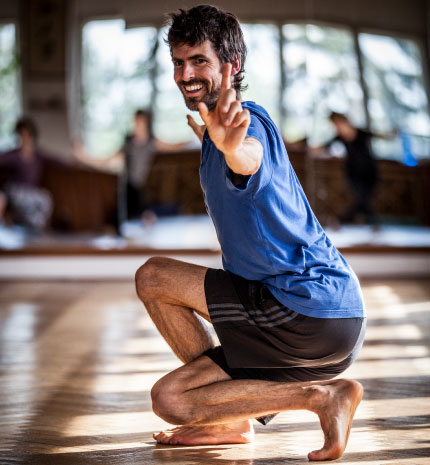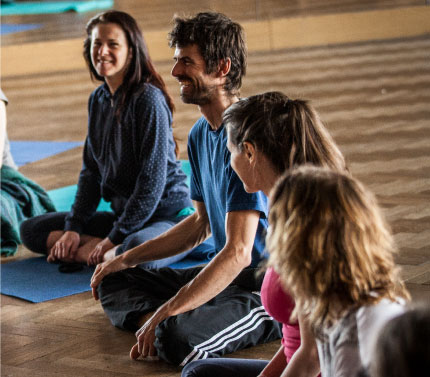
Dynamic Equilibrium and Sustainable Evolution
Whole Life Yoga Programs with James Boag
Dynamic equilibrium is the basis for health, whether it is in an individual, a couple, or a family, in a school, business, organisation or community. Yoga is the state of dynamic equilibrium, and also the practical means to cultivate and make more robust that state from which we can live with greater poise, ease, skilfulness and purpose in all aspects of life.
All too often, ‘modern’ representations of yoga are extraordinarily narrow and neglect the real juice of the perennially practical, underlying principles of a living tradition that has survived for millennia because it works, amidst the constant change and challenges of life.
Yoga is about working practically with all it means to be human, rehabilitating our innate gifts and our connection to the pilot of conscience, living with greater power and purpose and leaving things better than we found them.
In a world of mis and disinformation, the deep, underlying principles of yoga empower us to attune to conscience, to walk an authentic path that serves our deeper longings and the wellbeing of the whole.
Whole Life Yoga programs with James Boag are a means to empower your community or organisation with embodied, practical understanding of robust and adaptable principles to support dynamic equilibrium through all layers of our interactions.


Programs can be tailored to your needs, particular
interests and motivations, time and venue.
NB. As well as his native English, James can facilitate in French, Italian and Spanish without interpretation and programs in other language settings with interpretation are also possible.
Example Themes
All themes serve as a platform from which we can explore the time-proven principles of yoga in relation to ourselves and our world today, and as a focus of inquiry and exploration around which we can gather, learn and grow together. Programs can be based for example on:
Classic yoga texts:
Exploring key teachings from classic yoga texts or studying the original verses and sūtra-s in depth and applying their principles to all aspects of life. For example:
The Bhagavad Gītā: Transforming conflict into opportunity and making the whole field sing
Programs on the Gītā can range from a two hour talk to a course running over years. Its practical wisdom can be applied to all aspects of life, including learning, decision making, leadership, overcoming self-sabotage, working skilfully with fear and desire, with our minds, emotions and limiting beliefs, and how to integrate our different intelligences so we can align and attune more keenly to the pilot of our conscience.
The Yoga Sūtra: Weaving harmony into grounded reality
The distilled teachings of the Sūtra offer us robust, time-proven principles to help us navigate the challenges and opportunities of a human birth with greater ease, potency and skill. Programs can focus, for example, on essential qualities and principles that the text lays out to help us foster greater harmony in our lives today, or on structures and ethical frameworks to help us act more attuned to conscience and in ways that move towards deepening peace and integration.
Literature or poetry
If the group have familiarity with a text in common, for example a group of students who have read or studied Hamlet, (or Il Barone Rampante or Rāmāyaṇa), the program can unpack the text from a yogic perspective. Such texts can also serve as the lens of inquiry for a longer program. In the case of poetry, we can discover and look at a previously unknown poem in a short program too.
Song titles and lyrics
Using titles of pop songs as platforms to explore yoga teachings. For example:
The Yoga Top Ten (can also be the Yoga Sūtra or Bhagavad Gītā top ten)
Using ten song titles as means to explore key yoga teachings.
Bob Marley and the Bhagavad Gītā
Using lyrics and titles from the works of Bob Marley and the Wailers to explore timeless teachings from the Gītā.
Oasis in the Desert
Using song titles by Oasis as the platform.
Archetypes, questions or stories
Yoga and Archetypes to Live By
Working with archetypes through a practical yogic lens. This can be with archetypes like lover, warrior, magician, sovereign, student/apprentice, for example, and/or with deities, icons and stories from the yoga and broader spiritual traditions.
Yoga and Questions to Live By
Exploring how we can use skilful frames of questioning and attitudes of studentship, curiosity and ‘not knowing’ to help us come into more honest, easeful and generative relationship with ourselves and the uncertainties of life and existence.
Story based explorations
Working with rich, archetypal stories from the yoga tradition, and unpacking and experientially exploring their teachings.
